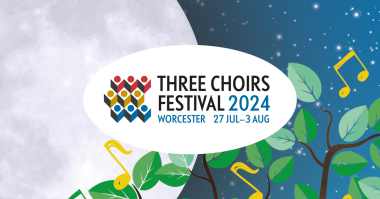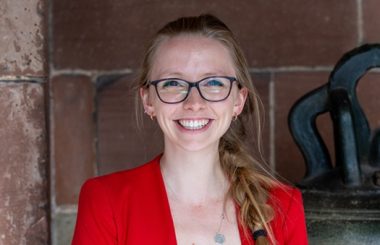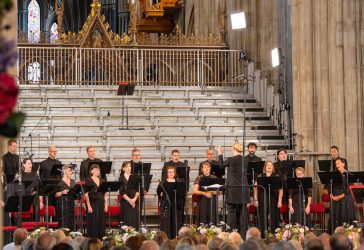
 United Kingdom Three Choirs Pageant [4] – Arakelyan, Britten/Lapwood, Poulenc, Weir: Mark Padmore (tenor), Charles Gibbs (narrator), Anna Lapwood, Nicholas Freestone (organ), BBC Singers, Philharmonia Orchestra Ensemble / Sofi Jeannin (conductor). Worcester Cathedral 30.7.2024. (JQ)
United Kingdom Three Choirs Pageant [4] – Arakelyan, Britten/Lapwood, Poulenc, Weir: Mark Padmore (tenor), Charles Gibbs (narrator), Anna Lapwood, Nicholas Freestone (organ), BBC Singers, Philharmonia Orchestra Ensemble / Sofi Jeannin (conductor). Worcester Cathedral 30.7.2024. (JQ)

Kristina Arakelyan – Seascapes (2021) interspersed with Britten (trans. Anna Lapwood) – 4 Sea Interludes from Peter Grimes (1945, trans. 2021, Lapwood organ)
Poulenc – Determine humaine FP 120 (1943/44)
Judith Weir – Within the Land of Uz (2017, Freestone organ)
On the most popular day of 2024 to this point, it was not only a pleasure but in addition a aid to see the BBC Singers on the Three Choirs Pageant tonight. Understanding how far into the longer term the diaries {of professional} musicians are booked, I think about that their invitation to look on the 2024 Pageant had been underneath dialogue for a while upfront; however again in 2023 it will need to have appeared unlikely that the BBC Singers would have the ability to seem on the Pageant since their very existence was underneath vital risk from BBC bean counters. Fortunately, evidently the existential risk has not less than receded and the BBC Singers duly got here to Worcester simply earlier than the beginning of their centenary season (2024-25). They’ll hint their origins again to 1924 when Stanford Robinson fashioned a gaggle often known as The Wi-fi Refrain. Since then, the ensemble, underneath a wide range of names, has been a necessary a part of the BBC’s music output. In latest many years they’ve cast a repute not only for the big selection of their repertoire but in addition for his or her service to modern music. Among the many numerous premieres which the group has given have been all three of the choral items on tonight’s programme.
For the beginning of this live performance they have been joined by the high-profile younger organist Anna Lapwood (b.1995) to play her transcription of Britten’s 4 Sea Interludes from Peter Grimes. I need to admit that once I first noticed the announcement of the programme, months in the past, I raised my eyebrows barely at seeing that the Interludes have been to be ‘interspersed with’ music I didn’t know. I’m so used to listening to the Interludes performed consecutively as a live performance merchandise however, on reflection I reasoned that within the full opera they happen not collectively however at varied factors within the rating. At that stage I used to be unaware that the BBC had commissioned the Armenian-British composer, Kristina Arakelyan (b.1994) to compose Seascapes particularly in order that her choral items would complement the Lapwood transcriptions. In that joint format, Seascapes was first carried out, by the BBC Singers, in October 2021. The mix of the Sea Interludes and Seascapes takes about 45 minutes to carry out, although each components may be carried out as standalone gadgets; I wish to hear Seascapes in that approach at some future date.
Anna Lapwood’s transcription undertaking started with ‘Daybreak’ which she transcribed some time in the past, as an unbiased merchandise, for a recital as a part of the Aldeburgh Pageant. Over the next couple of years, she transcribed the remaining three Interludes. She included the complete set on an album entitled Pictures, which she recorded on the organ of Ely Cathedral in 2021; I’ve not heard that disc (evaluate right here). These transcriptions have been new to me and I’ve to confess to blended emotions. On the one hand, there is no such thing as a denying the creativeness, aptitude and ability with which the transcriptions have been carried out and it’s intriguing to expertise the music in a brand new approach. Nonetheless, although I attempted to pay attention with open ears I discovered myself lacking sure issues from the acquainted orchestral scoring. As an illustration, I missed the snap of the brass as ‘Sunday Morning’ reached its climax and within the concluding ‘Storm’ the fantastic harp swirls close to the top have been sorely missed, as have been the incisive percussion interjections. To set towards that, nonetheless, the organ model, and Lapwood’s imaginative registrations on the cathedral’s Tickell instrument, introduced out a welcome quantity of inside element. And, in fact, the music was performed with nice virtuosity.
I used to be very taken with Seascapes. Right here, Arakelyan has taken 4 poems by Christina Rossetti and scored them for a cappella SSAATTBB choir. The poems have been perceptively chosen and the music was thoughtfully designed so that every choral merchandise complemented the previous Britten piece. I admired Arakelyan’s choral writing; the melodic traces have been very engaging and the harmonic language was fascinating and evocative. The spotlight for me was the third setting, ‘Echo’. Right here, the composer units the poem which begins ‘Come to me within the silence of the evening’. Her setting is slow-moving and intensely stunning. Fact to inform, although, all 4 settings are very wonderful and eloquent; they’re additionally extraordinarily well-imagined for voices. I’m eager to listen to Seascapes once more.
To shut the primary half Sofi Jeannin and the BBC Singers carried out Poulenc’s Determine humaine. Poulenc wrote these eight settings of poems by Paul Éluard in 1943. He hoped the set might be premiered in France as quickly because the nation was liberated from the Nazis however this proved to be not possible. The rating was despatched to England the place it was premiered by the BBC Refrain (forerunner of the BBC Singers) underneath their director Leslie Woodgate on Palm Sunday, 25 March 1945. The work thus has an vital half within the historical past of the BBC Singers but it surely additionally featured considerably of their latest historical past. When the ensemble was underneath existential risk in 2023, the musical institution rallied to their trigger to a formidable diploma. One of the vital public shows of assist got here from Sr Simon Rattle. In April 2023 he was resulting from conduct the LSO in Mahler’s big Seventh symphony. At brief discover, he invited the BBC Singers to carry out underneath his route after the Mahler; the chosen work was Determine humaine (evaluate right here). 4 months later, on the Proms, Rattle repeated this very sensible and public gesture of assist (evaluate right here).
I imagine that the unique impetus to Poulenc got here within the type of an invite to set one poem, ‘Liberté’; the undertaking expanded and that poem turned the end result of a a lot bigger cantata for 2 unaccompanied six-part choirs. Introducing the piece for the longer term BBC Radio 3 broadcast, Ian Skelly very justly noticed that Determine humaine required ‘supreme stamina’ from a choir and was ‘not for the faint-hearted’. It does certainly make virtuoso calls for on performers, not merely to barter the notes but in addition to interpret the music – and the texts. Within the BBC Singers we had an ensemble ideally geared up for the project. The singing was very good from first to final. I used to be very taken with the way in which the deep melancholy of the primary poem, ‘Bientôt’ (‘Quickly’) was put throughout. The quick, biting music in ‘Le Rôle des Femmes’ was delivered with panache, as was Poulenc’s transfer into trademark bittersweet concord later in the identical setting. Within the fifth poem, ‘Première Marche la voix d’un autre’ (‘First march, the voice of one other’), I used to be significantly impressed by the pinpoint accuracy in delivering the fast music, one thing which was a function elsewhere within the cycle. Every part leads as much as ‘Liberté’, in fact. It’s exceptional how Éluard relates the burning thirst for liberty to humdrum, on a regular basis issues. Poulenc’s music begins virtually innocently however the tempo and the depth are wracked up till the setting turns into an anguished however decided cri de cœur for freedom. Jeannin and her colleagues gave a shocking account of ‘Liberté’. Determine humaine is an unequivocal masterpiece and tonight’s magnificent, searingly intense efficiency was totally worthy of it.

After the interval we heard one work, Judith Weir’s In The Land Of Uz. This work was commissioned by Radio 3 and was first carried out in Southwark Cathedral, London throughout the 2017 Proms, by the BBC Singers underneath their then Chief Conductor, David Hill. It’s scored for SATB refrain, solo tenor, narrator and a small instrumental ensemble consisting of viola, double bass, soprano saxophone, trumpet, tuba and organ. Tonight, the tenor soloist, taking the function of Job, was Mark Padmore. I used to be very shocked to be taught that this was the Three Choirs debut of this distinguished singer; I hope he shall be invited again quickly. The narrator was Charles Gibbs, one of many BBC Singers’ basses. Members of the Philharmonia supplied the ensemble together with organist Nicholas Freestone, Worcester Cathedral’s Assistant Director of Music. Chief among the many instrumentalists was violist, Cameron Campbell, his instrument capabilities because the alter ego of Job.
I had not heard Within the Land of Uz earlier than. Judith Weir defined in a programme notice that the work ‘is a dramatised studying of the biblical Guide of Job, from which all of the textual content is taken, within the musical type of a cantata, or brief oratorio. The vast majority of the music is sung by the refrain, however there are additionally “obbligato” roles for a small group of devices which seem singly or in pairs; viola, double bass, soprano saxophone, trumpet, tuba and organ. Job seems once in a while as a solo tenor; his ideas are additionally represented by the viola. Though the majority of the storytelling is undertaken by the refrain, a talking narrator additionally makes occasional appearances.’
All of the drama is within the music; this can be a live performance work, not one conceived for the stage. It’s a rare composition, and a daring one. The vocal writing is fascinating and demanding. Padmore was a really perfect soloist; his plangent, clearly ringing voice carried simply to my seat midway down the nave and, as is all the time the case with this wonderful artist, he invested the phrases with nice expression. His was a compelling efficiency. Charles Gibbs was a wonderful narrator. He was positioned within the pulpit from the place he might be very clearly heard. He delivered the narration with nice intelligence. The instrumentalists dip out and in of the ‘motion’ in line with their function inside Weir’s compositional scheme. So, for instance, the soprano saxophone seems principally throughout the episode of Job’s Comforters (simply as in Vaughan Williams’s nice Job. A Masque for Dancing). The tuba just isn’t heard till fairly late on within the work when that instrument, together with the basses of the choir, invests the phrases of God with darkish majesty. Simply earlier than that time the trumpeter and organ mix thrillingly for instance the whirlwind. Violist Campbell had probably the most to do among the many instrumentalists; the nutty sound of his instrument was ideally imagined by Weir to voice the inside ideas of Job and Campbell performed with notable eloquence. The BBC Singers delivered the complicated choral elements with all of the incisiveness and dramatic depth that one would anticipate from this wonderful ensemble. Sofi Jeannin managed the efficiency expertly, bringing all of the disparate vocal and instrumental forces collectively seamlessly.
As I stated, Within the Land of Uz is a rare work. I don’t imagine a recording has been made however, in any case, I’m wondering if the piece would make fairly the identical impression on CD or radio. Although there is no such thing as a bodily ‘motion’, I believe it’s a kind of items that’s greatest skilled when one can see in addition to hear the performers. That stated, I shall pay attention with curiosity when the live performance is broadcast on Radio 3 in the end. There was a considerable viewers for this live performance and each the performers and Judith Weir have been warmly applauded, indicating that Within the Land of Uz had made its mark.
This was a difficult however rewarding live performance, beautifully carried out. As I listened to the music, I mirrored that in all probability solely the BBC may or would mount such a programme – and credit score to the Three Choirs Pageant for taking the business threat of internet hosting it. We have to be grateful that the BBC Singers have survived however vigilance shall be required to forestall the Company from making an attempt to take the axe to this extraordinary ensemble at a future date. The BBC Singers are a vitally vital a part of the UK’s musical life, particularly as regards modern music; we might all be poorer with out them.
The live performance was recorded for transmission on BBC Radio 3 within the autumn when the BBC Singers’ centenary sequence is underneath approach.
John Quinn


